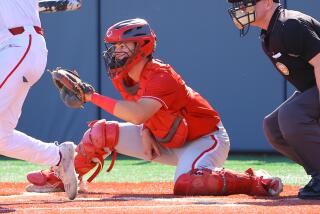Persistence Pays Off in Spradlin’s Long Road to Majors
- Share via
SAN DIEGO — It has been a strange road to the major leagues for Philadelphia Phillies relief pitcher Jerry Spradlin.
He pitched only three innings at Katella High, for the freshman team. He was cut after that. He tried out again as a sophomore, junior and senior, but each time failed to make the team.
“The coaches apparently thought I was too much of a project,” said Spradlin, who kept pitching for lower-profile summer league teams.
For two years after high school, Spradlin didn’t pitch at all. He worked a series of odd jobs: in a lumber yard, warehouse, gas station and a fast food restaurant.
Finally, his father gave him an ultimatum: Go to college or the military.
Spradlin enrolled at Fullerton College, but was hesitant about trying baseball again. It took some strong urging from a classmate--”I finally decided to walk on there to get him off my back as much as anything,” Spradlin said.
Spradlin made the Hornets’ team, but with five weeks left in the season, was kicked off it. He says a conflict developed between him and Coach Nick Fuscardo over Spradlin’s decision to stay home one weekend to work rather than accompany the team on a trip.
Spradlin wanted to keep pitching, and former Angel pitcher Clyde Wright came to his rescue.
Spradlin had taken a few lessons at Wright’s baseball school during his high school and college days, and now returned for some help. Wright tutored him, helped him get on a summer team in the Orange County Amateur Baseball Assn. and encouraged some major league scouts to watch him.
The result? The Cincinnati Reds drafted him in the 19th round of baseball’s amateur draft in 1988.
And today?
Spradlin, a 6-foot-7 right-hander in his second full season in the majors, has become one of the more promising relievers for the Phillies, who remain in the National League’s wild-card race.
He has a 3-4 record and a 3.61 earned-run average in 50 appearances for Philadelphia, which wraps up a three-game series against the host Padres with a game at 2 today.
In his last 17 games, Spradlin’s ERA is 2.21 and he has 18 strikeouts with only four walks. During one stretch, Spradlin went 31 2/3 innings without giving up a walk.
“Very quietly he’s on his way to a tremendous year,” Phillie Manager Terry Francona said. “He’s got a dynamite arm and he’s very resilient. We’ve asked a lot of him this season, but he’s always taken the ball.”
Spradlin made 76 appearances last season, the fifth highest in the National League, and finished 4-8 with a 4.74 ERA. No Phillie reliever has been that active since David West’s 76 appearances in 1993.
Spradlin’s fastball continues to improve and his slider has become particularly effective. He has been clocked a few times at 100 mph, and has been in the mid-90s fairly consistently all season.
“The added velocity has probably been one of the big differences for me,” Spradlin said.
Spradlin said the team’s trainers also have helped him develop a better range of motion in his pitching arm. “I think I lost some of that when I worked on weights in the off-season,” he said. “They stretch me out now every day now, and I think it’s helped.”
That, and getting back to his old way of pitching.
Spradlin made 37 appearances with the Reds in 1993, but only six in ’94.
“When I went back with them in 1994, they tried to change my mechanics quite a bit and that sort of messed me up,” he said. “They wanted to lower my leg kick. I tried it, but I wasn’t as comfortable that way. It wasn’t fluid the way it was before.
“I’ve done it my way ever since. When I kick higher, I can hide the ball better. It’s behind me and [the batters] don’t get a good look at it until I release it. “
The Phillies signed Spradlin to a minor league contract after the Reds released him following the 1996 season. Pitching coach Galen Cisco has allowed Spradlin to do it his way.
“We’ve worked with him mainly on staying ahead on the count,” Cisco said. “When he does that, he’s fine. When he doesn’t is when he has some trouble. But you have to like his arm. I know he’s getting noticed around the league, and some other people are interested in him. That’s usually a good sign.”
At 31, Spradlin is something of a late-bloomer.
“But for his age, he’s got a young arm,” Cisco said. “He should be able to have four or five more good years.”
Katella baseball Coach Tim McMenamin sees a big difference between the player he cut in Spradlin’s senior year and the one pitching now.
“I turn on the TV and watch him, and it’s obvious he’s a lot bigger and stronger,” McMenamin said. “When he tried out his senior year for me, he had some good mechanics, but I didn’t see him getting much playing time with us.”
McMenamin said he has been impressed by Spradlin’s development. “That’s a real credit to him,” McMenamin said. “He’s kept going when 99 out of 100 other guys would have quit.”
Fuscardo said he feels much the same way.
“When I see a guy like Jerry step up and be successful, I’m proud of him,” Fuscardo said. “I follow him in the box scores and I’m happy when he does well. There’s no ill will there as far as I’m concerned. I think it was a growing situation for him when he was at Fullerton, and I hope what happened there helped him in the long run.”
But Wright is particularly pleased that he was able to help Spradlin when he needed help the most.
“That kid worked his butt off,” Wright said. “People kept telling him he couldn’t play baseball, and he wouldn’t listen to any of it.
“I knew he didn’t have much money, but when I opened my baseball school 20 years ago, I said I wouldn’t let money stand in the way of a kid I thought had some potential. Everyone kept beating him down and telling him to go another direction. When he came to me, the only problem he had was that he didn’t have any confidence.”
When Spradlin received his signing bonus, he gave Wright $1,000, as repayment for his pitching lessons. He still works out with Wright at times during the off-season.
“I probably wouldn’t be playing now if it weren’t for him,” Spradlin said. “He believed in me when not a lot of other people did.”
More to Read
Get our high school sports newsletter
Prep Rally is devoted to the SoCal high school sports experience, bringing you scores, stories and a behind-the-scenes look at what makes prep sports so popular.
You may occasionally receive promotional content from the Los Angeles Times.






